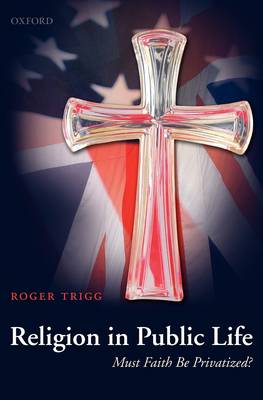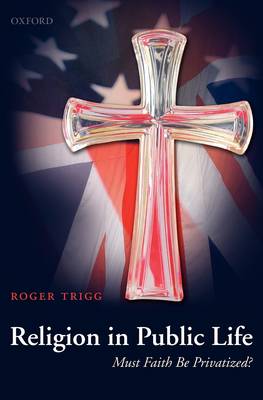
Bedankt voor het vertrouwen het afgelopen jaar! Om jou te bedanken bieden we GRATIS verzending (in België) aan op alles gedurende de hele maand januari.
- Afhalen na 1 uur in een winkel met voorraad
- In januari gratis thuislevering in België
- Ruim aanbod met 7 miljoen producten
Bedankt voor het vertrouwen het afgelopen jaar! Om jou te bedanken bieden we GRATIS verzending (in België) aan op alles gedurende de hele maand januari.
- Afhalen na 1 uur in een winkel met voorraad
- In januari gratis thuislevering in België
- Ruim aanbod met 7 miljoen producten
Zoeken
€ 85,45
+ 170 punten
Omschrijving
How far can religion play a part in the public sphere, or should it be only a private matter? Roger Trigg examines this question in the context of today's pluralist societies, where many different beliefs clamor for attention. Should we celebrate diversity, or are matters of truth at stake? In particular, can we maintain our love of freedom, while cutting it off from religious roots? In societies in which there are many conflicting beliefs, the place of religion is a growing political issue. Should all religions be equally welcomed in the public square? Favoring one religion over others may appear to be a failure to treat all citizens equally, yet for citizens in many countries Christian heritage is woven into their way of life. Whether it is the issue of same-sex marriages, the right of French schoolgirls to wear Islamic headscarves, or just the public display of Christmas trees, all societies have to work out a consistent approach to the public influence of religion.
Specificaties
Betrokkenen
- Auteur(s):
- Uitgeverij:
Inhoud
- Aantal bladzijden:
- 274
- Taal:
- Engels
Eigenschappen
- Productcode (EAN):
- 9780199543670
- Verschijningsdatum:
- 15/07/2008
- Uitvoering:
- Paperback
- Formaat:
- Trade paperback (VS)
- Afmetingen:
- 135 mm x 201 mm
- Gewicht:
- 294 g

Alleen bij Standaard Boekhandel
+ 170 punten op je klantenkaart van Standaard Boekhandel
Beoordelingen
We publiceren alleen reviews die voldoen aan de voorwaarden voor reviews. Bekijk onze voorwaarden voor reviews.









